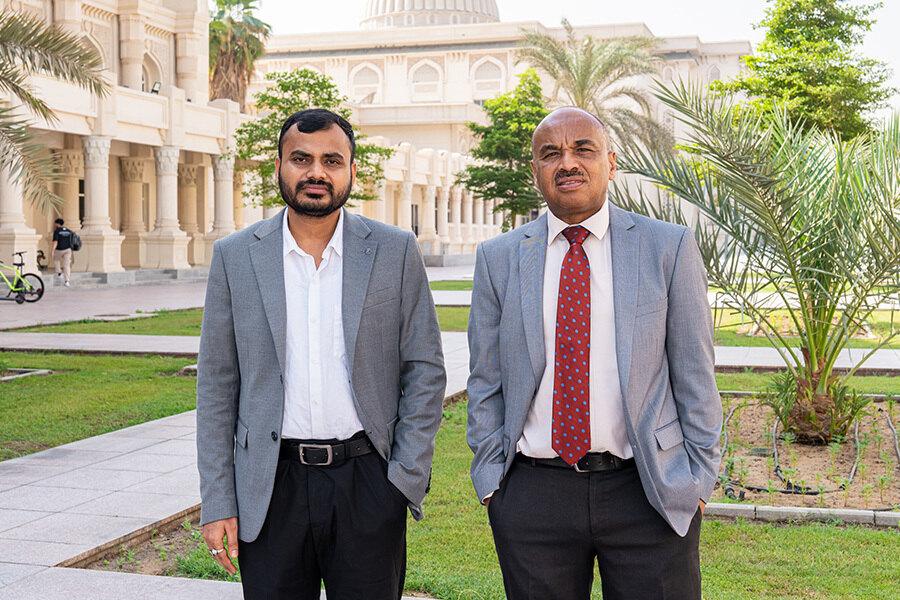- About
- Admissions
- Study at AUS
- Prospective Students
- Bachelor's Degrees
- Master's Degrees
- Doctoral Degrees
- Admission Publications
- International Students
- Contact Admissions
- Grants and Scholarships
- Sponsorship Liaison Services
- Testing Center
- New Undergraduate Student Guide
- Undergraduate Orientation
- New Graduate Student Guide
- Graduate Orientation
- File Completion
- Payment Guide
- Students with Disabilities
- Executive and Continuing Education
- Academics
- Life at AUS
- Research
- Publications
- Contact Us
- Apply Now
- .

AUS researchers win first prize for AI-driven urban cooling research at Rashid Bin Humaid Award
American University of Sharjah (AUS) researchers Dr. Tarig Ali, Professor of Civil Engineering, and Dr. Rabin Chakrabortty, postdoctoral fellow, have won first prize in the Rashid Bin Humaid Award for Culture and Science (environmental sciences category) for their study, Urban Heat Island Mitigation in Ajman Using the InVEST Urban Cooling Model and Deep Learning.
Imagine a city map that shows exactly where shade should fall and which rooftops should reflect more sunlight. This approach, developed by the AUS team for Ajman using a combination of artificial intelligence and climate modeling to pinpoint street-level strategies that can lower temperatures and reduce cooling demand.
The researchers approached the issue of urban heat as a design challenge. With Geographic Information Systems (GIS) approach that layers and analyzes location-based data, they examined Ajman’s thermal patterns and land use in detail. They paired this with the InVEST Urban Cooling Model, an open-source tool that estimates how trees, parks and surface materials influence local air temperature, and with deep-learning methods that recognize complex patterns in large datasets. Together, these methods revealed how tree canopies, high-albedo (reflective) surfaces and continuous shade routes can work in concert to cool neighborhoods and ease energy demand.
“Cities can be cooler by intent,” said Dr. Ali. “By combining geospatial intelligence with AI, we implemented climate and land-use data into clear design guidance: where to plant, where to brighten and how to link patches of shade so planners can act with confidence.”
The study links temperature reductions to estimated energy savings, giving decision makers a way to compare options in terms that residents and utilities can understand.
“When pixels turn into policy, communities feel the difference,” said Dr. Chakrabortty. “Our approach shows where cooling works hardest, from closing a single canopy gap to addressing clusters of heat-trapping roofs, and connects those choices to lower cooling energy demand. That is how evidence becomes an investment plan.”
Developed in the GIS and Mapping Laboratory at the AUS College of Engineering, the method supports UAE Net Zero 2050 and Ajman Vision 2030 by turning national climate goals into local action. It can guide cooler street layouts, inform building and materials choices, and help public agencies prioritize projects that deliver measurable comfort and energy benefits across the UAE.
“Our goal was to develop a tool that supports both planners and residents,” added Dr. Ali. “For planners, it provides a prioritized framework for urban cooling interventions. For residents, it translates into shaded pathways, lower indoor temperatures and measurable energy savings achieved through smart evidence-based design.”
The team welcomes collaboration with government entities and stakeholders to translate findings into pilot projects including district greening, shade-first street retrofits and reflective roofing initiatives, supported by a monitoring plan that tracks temperature and energy outcomes over time.
“Climate resilience happens block by block,” said Dr. Chakrabortty. “Start in the right places, measure the gains, refine and scale. Ajman can lead the UAE in heat-smart urban design.”
The Rashid Bin Humaid Award for Culture and Science is an Ajman-based prize that recognizes outstanding contributions across cultural and scientific fields from the UAE, GCC and the MENA region. Held under the patronage of the Ruler of Ajman, the award promotes work with clear public benefit and highlights projects that advance knowledge, inform policy and practice and strengthen community wellbeing.
Researchers at AUS focus on applied work that serves the UAE’s priorities in sustainability, infrastructure and community wellbeing. Across labs and classrooms, faculty and postdoctoral scholars mentor students, build interdisciplinary collaborations and translate technical findings into solutions decision makers can use. The AUS College of Engineering fosters this culture of impact by connecting data to design and research to real-world results so innovations developed on campus can help shape healthier, more resilient cities across the country.
Learn more about the AUS College of Engineering here.
Explore the AUS research ecosystem here.

